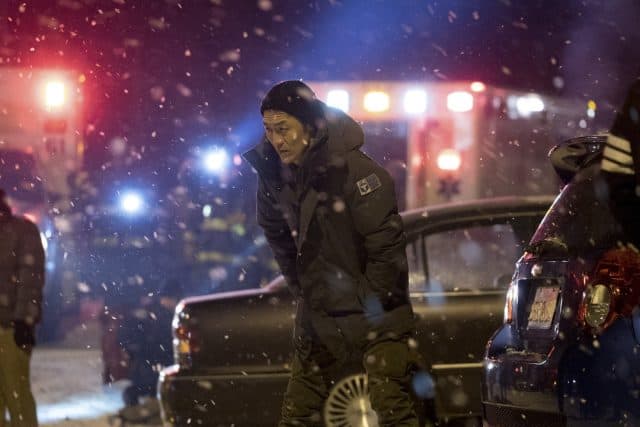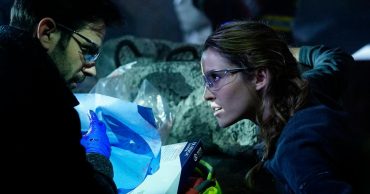
Just because the holidays are long over, doesn’t mean there’s not a dangerous cold outside. Speaking from the eye of the storm, extra caution must be taken when Mother Nature decides to roar particularly loud. Chicago winters can be brutal, which means Chicago Med has to be on alert for all sorts of potential injuries. It’s the perfect time in the season for unforeseen disasters to strike, which means tough decisions have to be made on who lives, who dies, and who has to take their chances.
Nothing says dangerous weather conditions like a multi-vehicle accident in a snowstorm. I’m not sure who put Dr. Latham in charge of emergency triage for this, but it was a good call. Latham does a very efficient job of assessing half a dozen patients in under a minute. Latham can’t afford to show his compassion because for him, it would inhibit his ability to do his job efficiently. He knows what is priority and what is not, even when a doctor might not agree with it. It’s tough for Dr. Choi in particular to take. When his patient is terminal, there is nothing that can be done but wait out the remainder of his life in the hospital waiting for his wife. Unfortunately, a limited amount of resources forces Choi into a corner. He tries everything he can to give his patient time to say goodbye to his wife, but everyone and everything is spread too thinly. The man’s last act on Earth is to tell Dr. Choi to let him go so he can save another patient. Choi is able to save a life almost immediately. Limited resources affect the blood bank, forcing a mother to choose between her son and her nephew. She can’t do it, so the hospital does it for her, leaving one child on the brink of death. With Choi’s hands free, he is able to donate the remaining blood to the other boy.
A patient in an emergency situation doesn’t have time to question if the doctor treating them is trustworthy. That’s why it’s up to the people in charge to determine how fit an employee is for work. ER Resident Dr. Wheeler questions if he made a bad call on a pregnant mother, putting her and her baby’s life in jeopardy. Remember that this guy is already on thin ice for drinking on the job. Sirens should be going off all over the ER when Wheeler asks Reese for a prescription to take the edge off. Someone needs to pay attention before this guy’s issues kills someone.
In a crisis situation, the last thing you need is more stress added to the situation. An increasingly irate patient in the waiting room qualifies as stress to both the patients and the staff, which is why Dr. Charles is so concerned. Certain traumas take priority over others. When it’s a choice between a physical injury and a psychological one, the first priority has to be keeping patients alive. A man in extreme emotional distress demanding a refill of his pain medication just can’t be the top priority. Charles is upset when the patient commits suicide as a result of waiting so long, until said man shows up in the psychiatric wing with a “Did I get your attention?” attitude. This may be the first time I’ve seen Dr. Charles genuinely angry. Committing the patient to a 72-hour psychiatric hold seems necessary for several reasons.
Since winter storms are not over for this season, everyone stay safe out there!
 Follow Us
Follow Us




